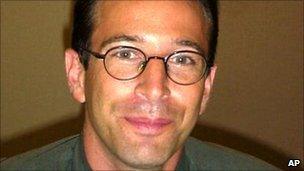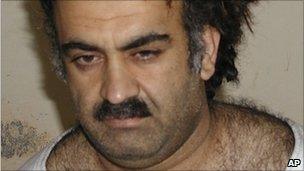Daniel Pearl's killers 'wrongly convicted'
- Published

The Wall Street Journal's Daniel Pearl was abducted in Karachi in 2002 while researching Islamists
The four men convicted of murdering US journalist Daniel Pearl in Pakistan nine years ago did not carry out the beheading, an investigation has found.
The four did help kidnap the Wall Street Journal reporter in Karachi, according to the Pearl Project, a report by US journalists.
But it found forensic evidence supports al-Qaeda number three Khalid Sheikh Mohammed's confession to the murder.
Pearl was abducted in January 2002 while researching Islamist extremism.
A month later a video of the 38-year-old's killing was sent to US officials in Pakistan.
Within months, a British national of Pakistani descent, Ahmed Omar Saeed Sheikh, and three others were convicted of the reporter's murder.
Sheikh was sentenced to death, while the others were handed life terms.
The Pearl Project said that Pakistani authorities had persuaded a taxi driver, an important witness at the trial, to change his earlier account and say he saw Sheikh near the restaurant where Pearl was kidnapped.
'Beheading botched'
While Sheikh has admitted helping to organise the abduction, he has always denied being in Karachi when it took place.
The Pearl Project says that US investigators have found evidence that the beheading was carried out by Khalid Sheikh Mohammed, who faces charges in connection with the 11 September 2001 attacks in the US.
A technique known as vein-matching found that the veins on Mohammed's hand matched those on the hand of Pearl's killer, seen in the gruesome video.
The al-Qaeda number three was captured in Pakistan in March 2003 and sent to Guantanamo Bay three years later.
Mohammed, who was waterboarded by US interrogators, said he had used his own "blessed right hand" to behead the journalist, according to Pentagon papers.
The Pearl Project also found that the videotaping of the decapitation had been botched because the cameraman asked to restart filming when the journalist's neck had already been cut.
Mohammed severed Pearl's head on the second attempt, according to the three-year journalistic investigation with Georgetown University in Washington DC.
'Weak case'
Sheikh's lawyers accuse the authorities of deliberately stalling their client's longstanding appeal against his conviction because they know they would lose.

Khalid Sheikh Mohammed reportedly said he used his own 'blessed right hand' to behead Pearl
But prosecutor Raja Qureshi denied the claims, telling the Associated Press news agency: "I challenge the defence to come and attend the case properly and consistently, and they will themselves know whose case is weak."
Sheikh is a known militant who was arrested and jailed in India for kidnapping four tourists, three British and one American, in 1994.
Five years later the Londoner was freed and given safe passage to Afghanistan in a hostage swap for the passengers of a hijacked Indian airliner.
Pearl's remains were found in a shallow grave on the outskirts of the southern port city of Karachi four months after his death.